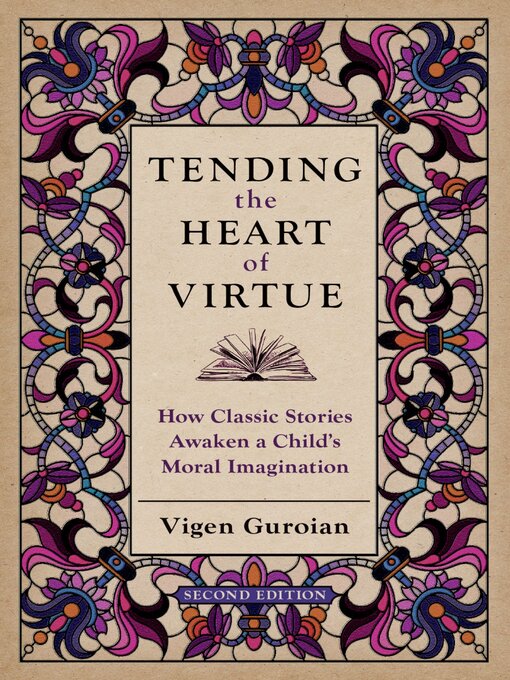Tending the Heart of Virtue
How Classic Stories Awaken a Child's Moral Imagination
-
Creators
-
Publisher
-
Release date
January 31, 2023 -
Formats
-
Kindle Book
-
OverDrive Read
- ISBN: 9780197678831
-
EPUB ebook
- ISBN: 9780197678831
- File size: 2211 KB
-
-
Languages
- English
-
Levels
- Lexile® Measure: 1260
- Text Difficulty: 9-12
-
Reviews
-
Publisher's Weekly
May 25, 1998
Guroian is an Eastern Orthodox theologian whose intention is to help busy parents make the right choices of "what books and stories to read with children." But this hasn't the content of William Bennett's anthology, and it's scarcely a guide in the way that Noel Perrin's recent first-rate volume, A Child's Delight, is. Guroian devotes the bulk of the text to explaining the Christian (ergo "virtuous") underpinnings and symbology of a few works by Hans Christian Andersen, C.S. Lewis and George MacDonald. The problem is he never gives a sense of artistic proportion or shows how or why classic stories are more likely to "waken a Child's Moral Imagination" than a Spiderman comic. Ironically, he points out that "ere instruction in morality is not sufficient to nurture the virtues. It might even backfire, especially when the presentation is heavily exhortative and the pupil's will is coerced." His discussions are often just that, loudly demonstrating nothing so much as his own facility in detecting biblical allusions. He finds that the themes of love and friendship in Carlo Collodi's Pinocchio and Kenneth Grahame's Wind in the Willows owe their sublimity to Christianity rather than their authors' humanity. Having damned critics Roger Sale and Jack Zipes for discerning faults in Andersen's "The Little Mermaid," he says of the story's ending that we must ask ourselves: "why would we want our children or ourselves to be content with when immortality has been proffered?" Unfortunately, such arrogance pervades Guroian's tome. The concluding bibliographic essay is dismally short of recommendations. -
Booklist
May 1, 1998
Guroian is a theologian who believes that the great Western fairy tales and literary fantasies can teach children to be good. He speaks as parent and teacher as much as minister. Above all, he is a reader: he knows that a good story can do far more than hours of hectoring and sermonizing to move children with the drama of good and evil. He discusses "Pinocchio," "The Snow Queen, Beauty and the Beast, "C. S. Lewis' Narnia series, and other classics with sensitivity and depth. However, his message is simplistic: children must learn that good and evil are absolutes, and the choice is clear; enough of this contemporary moral relativism; enough of subjectivity and cultural differences. Many will disagree with his insistence on "universally binding moral norms." What about those who dare to feel sympathy for the bad guys? Don't we all get different things from the great stories? Guroian's mentors include William Bennett, and admirers of "The Book of Virtues" (1993) will find much to appreciate here. ((Reviewed May 1, 1998))(Reprinted with permission of Booklist, copyright 1998, American Library Association.) -
School Library Journal
September 1, 1998
The word virtue in the title, as well as the reference in the introduction to William J. Bennett and Russell Kirk, bear witness to the author's position as a conservative and a member of the religious right. His aim in this intelligent and persuasive book is to encourage parents in their efforts to "form moral character in the young" through stories that are rich in moral messages and Christian mystic vision. He finds these qualities in works by Hans Christian Andersen, C. S. Lewis, George MacDonald, and classic 19th-century and early 20th-century literary fairy tales with themes of good and evil, sin and redemption, faith and mystic love. As a teacher of children's literature, he is well aware of educational programs propounding values clarification, and literary critics who approach stories from secular, social scientific, and psychological viewpoints, but what he seeks are works that embody "universally binding moral norms" with values that are rooted in God. Not surprisingly, Guroian finds these qualities in stories of the last century, when education was a matter of building character rather than acquiring information and practicing critical thinking. This scholarly yet readable book will provide assurance and inspiration to adults who look for titles that are strong in what he calls "moral imagination." His discussions of the religious and ethical assumptions on which the works of these classic authors are founded will, for teachers and literary critics, provide a useful corrective to postmodern reliance on secular and psychological analysis of all texts. His is a responsible voice for the value of tradition and of religion.-Shirley Wilton, Ocean County College, Toms River, NJ
-
Formats
- Kindle Book
- OverDrive Read
- EPUB ebook
Languages
- English
Levels
- Lexile® Measure:1260
- Text Difficulty:9-12
Loading
Why is availability limited?
×Availability can change throughout the month based on the library's budget. You can still place a hold on the title, and your hold will be automatically filled as soon as the title is available again.
The Kindle Book format for this title is not supported on:
×Read-along ebook
×The OverDrive Read format of this ebook has professional narration that plays while you read in your browser. Learn more here.



